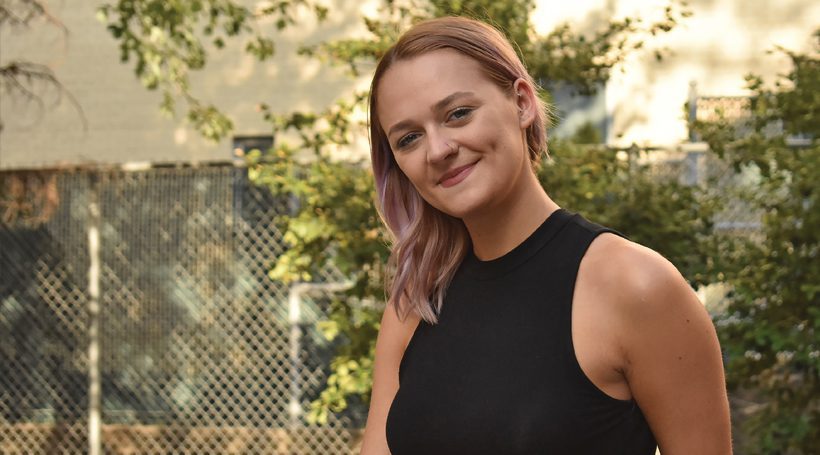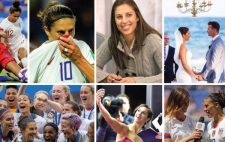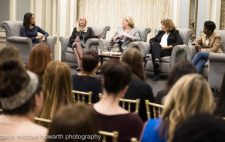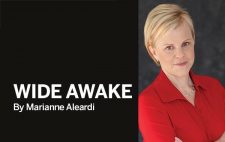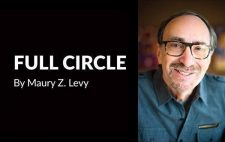Photo: Max Finke
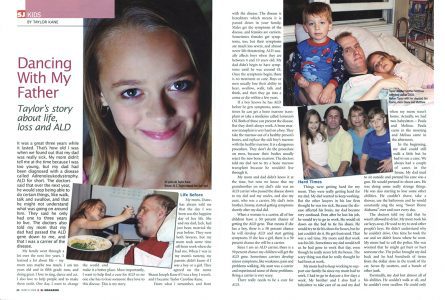
SJ Magazine first met Mount Laurel’s Taylor Kane when she was in 5th grade and sent us a story she had written about her father’s death when she was 5. The story was so well-written and so touching, we published it in our March 2009 issue. Taylor spent the rest of her childhood becoming an influential activist for people with rare diseases. Now a senior at George Washington University, Taylor continues to impress and inspire, as she works to help people around the world who have a rare disease – including her.
Taylor Kane can’t remember when she first learned she carries a rare disease called Adrenoleukodystrophy, or ALD. The disease, a deadly genetic affliction that impacts 1 in 18,000 people, has always been part of her life: her dad was diagnosed when Taylor was 3, and he died before her sixth birthday.
“My life was consumed with ALD,” says Kane, now 20. She soon came to understand that, because the disease is linked to the X chromosome, she’s a carrier. That means her children stand a 50 percent chance of inheriting the condition, and while ALD likely won’t be fatal for Kane, she may eventually develop symptoms of her own.
It’s enough to crush even the strongest spirit, but Kane, a Mount Laurel native in her senior year at George Washington University, rose to the occasion, becoming an advocate and organizer within the rare disease community. Last month she published her first book, “Rare Like Us: From Losing My Dad to Finding Myself in a Family Plagued by Genetic Disease.” Writing it meant re-living the most difficult years of her life, back before she’d even started kindergarten.
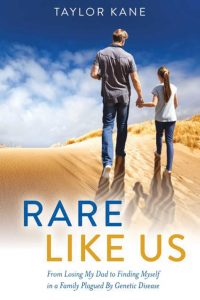 “My dad was always a neat, organized person. My mom started to notice he didn’t care about those things anymore, and he was suddenly just so different,” Kane says of the days leading up to her father’s diagnosis. “They actually ended up going to marriage counseling because of his new personality traits. The counselor suggested he get an MRI.”
“My dad was always a neat, organized person. My mom started to notice he didn’t care about those things anymore, and he was suddenly just so different,” Kane says of the days leading up to her father’s diagnosis. “They actually ended up going to marriage counseling because of his new personality traits. The counselor suggested he get an MRI.”
In the two years between his diagnosis and death from a disease so rare it has no approved treatment, Kane’s dad lost the ability to walk, speak or swallow, and he developed dementia. In the book, Kane’s description of his decline is pointed and occasionally intense. He was 51 when he died in 2003.
“While some might consider these details too private or embarrassing to be put into writing, I disagree, and I know my dad would too,” she writes in the book’s introduction. “Medical symptoms should not have to be hidden as shameful secrets. My dad was not his symptoms; suffering them was not his choice.”
Kane is also frank about her own medical anxieties. When she was 13, her mom took her to meet with one of her dad’s doctors and a genetic counselor at an ALD specialty institute in Maryland.
“I remember being 13 and feeling like, ‘Why do I have to go there? I already get it,’” she recalls. “In retrospect, I’m so grateful for that meeting. At that point the ALD community knew carriers could develop physical symptoms, and the doctor explained this to me, telling me what to look out for as I got older. The genetic counselor explained my carrier status and talked to me about my options.”
But understanding her circumstances – having children one day will require interventions like in-vitro fertilization and pre-implantation genetic testing – didn’t make being a teenage girl any less complicated.
“I’d be talking to a new boy at school and I’d wonder, like, so is this something I have to tell someone? Is this information someone should know right off the bat? Should I date someone for a year and then tell them? ALD obviously affects males way more severely, so most of the research and the conferences and everything focuses on them,” Kane says. “But I wished there was something within the community where girls like myself could turn. I was in Facebook groups, but I knew I wouldn’t be comfortable being like, ‘Hey, should I tell my high school boyfriend?’”
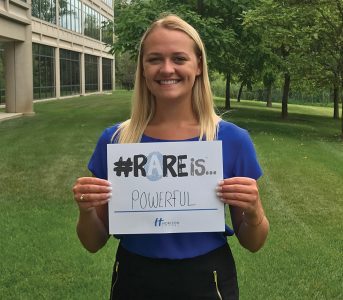 Since she couldn’t find the community she really needed, Kane decided to build it. She started a Facebook support group called YAC, for “young ALD carriers.” It’s an online community for women 30 and under, which now has more than 100 members from all over the world, and for Kane, it was just the beginning.
Since she couldn’t find the community she really needed, Kane decided to build it. She started a Facebook support group called YAC, for “young ALD carriers.” It’s an online community for women 30 and under, which now has more than 100 members from all over the world, and for Kane, it was just the beginning.
“I was getting more involved with the rare disease community toward the end of high school,” she says. “I learned that there are other ‘boys’ diseases,’ where girls are considered just carriers. For such a long time it was assumed that girls just carried the gene in their body, like a vessel, but there’s a lot of psycho-social side effects, too. I realized that in all these different communities, groups of carriers were fighting these same battles. I thought, ok, let’s create a group that brings together all these x-linked carriers.”
Kane launched a non-profit organization called Remember the Girls, aimed at bringing together carriers of a range of genetic diseases.
“Even though our diseases are different, coming together brings our voices power,” Kane says. “We also have a Facebook group with over 200 members from all over the world and from over 10 different disease groups.”
The organization has a medical board of three doctors and focuses on projects involving genetic testing, alternative reproduction and quality of life for carriers.
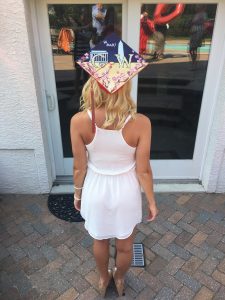
Taylor with her high school graduation cap
“A specific project we’re working on right now is making a reproduction options toolkit we want to put on our website,” Kane says. “It will be a list of all the options a carrier can choose, with an in-depth explanation, information about insurance coverage, risks and benefits, short testimonials and videos from genetic counselors explaining the scientific aspects.”
Kane’s already reached hundreds through her social media outreach groups, her non-profit, and the many speaking engagements she’s had in the last several years. “Over the last year I’ve had people say I’m becoming an influencer in the rare disease community,” she says. “I’m glad that telling my story has been able to help raise awareness both in and outside the community.”
With the release of “Rare Like Us,” which she says took between two and three years to write, she’s hoping to reach many, many more.
“The first and most important reason I wrote this book is to spread awareness,” she says. “A disease is rare if it affects fewer than 200,000 people, and 95 percent of rare diseases have no FDA-approved treatment. It can be isolating having something most people, including most doctors, haven’t heard of. I wanted to encourage people to band together. There are 400 million people in the rare disease community – more than the population of the United States. I think there’s power in numbers.”
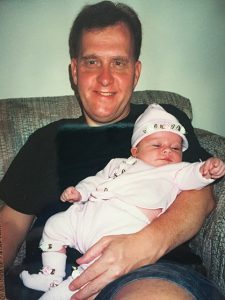
The late John Kane with Taylor
She also, quite simply, wrote it for her family, including, of course, her dad. He’d be so excited, she says, and proud of what she’s been able to put out into the world.
“It wasn’t difficult to write,” she says. “This is my story. It definitely brought up some memories and things I haven’t thought about in a while. I learned a lot more about my dad. I think that was my favorite part of writing the book. I love hearing stories about him and getting to learn more about what he was like.”
The book’s primary takeaway, though, is one about perseverance and healing. Kane says her message is one you don’t need to carry a rare disease to understand.
“I think this book can be applicable to a lot of people’s lives,” she says. “Anyone can make a meaningful positive difference in the world. You don’t have to be wealthy or have connections. You don’t even have to be old enough to drive. You can start at any age. You just need the desire and determination and passion. I think that’s the biggest takeaway. Losing someone is hard, but I’ve devoted my life to living passionately and that’s helped me cope and find the light in my loss.”


